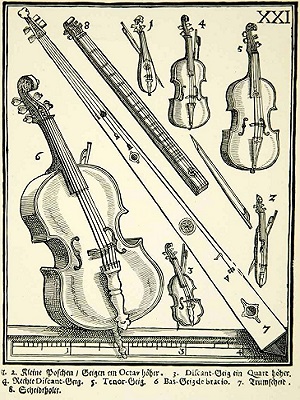In addition to music history and theory offered by the Jacobs School of Music, the Historical Performance Institute offers a wide selection of courses including Literature and Performance Practices of Medieval, Renaissance, Baroque and Classical Music (4-course series); Continuo Readings and Performance; Playing and Singing from Original Notation; Bibliography; Research in Early Music (with changing topics); and Seminars. Please contact us if you would like further information regarding the Historical Performance Institute.
Please check the Schedule of Classes for course offerings each semester and consult individual course entries in this schedule for information on course prerequisites and corequisites.
For Early Music Performance Study courses (lessons, masterclass, and recitals), please click here.

MUS
F420
-
Topics in Performance Study
MUS
F501
-
Accompaniment of Baroque Music
P: Successful completion of a graduate keyboard proficiency examination and consent of instructor. Introduction to the art of accompaniment of seventeenth- and eighteenth-century music. Repertoire is selected from a wide variety of chamber and larger works, both vocal and instrumental. Included in the study are recitative, embellishment, and improvisation.
MUS
F502
-
Topics in Basso Continuo
P: Successful completion of a graduate keyboard proficiency examination and consent of the instructor. Primary sources regarding basso continuo performance practices are examined. Emphasis is on performance from figured and unfigured bass.
MUS
F503
-
Advanced Topics in Basso Continuo
National styles of basso continuo practice from the seventeenth and eighteenth centuries. Readings and application to compositions of selected composers.
MUS
F520
-
Topics in Performance Study
MUS
M408
-
Lute Sources and Repertoire
An overview of all sources, both manuscript and printed, of solo lute music, c. 1500-c. 1750, together with repertoire contained in those sources.
MUS
M409
-
Lute Treatises and Instruction Manuals
A study of all original instructional material and treatises from c. 1500-c. 1750 which describe techniques and performance styles for lute and other historical plucked strings.
MUS
M415
-
Interpreting Unaccompanied Bach
Study and performance of the unaccompanied works by J.S. Bach for violin, cello, and flute. Consideration of structural musical elements based on autograph manuscripts. Open to all instrumentalists other than keyboard players.
MUS
M435
-
Performance Practice Before 1750
Medieval, Renaissance, and Baroque repertory studied in light of historical performance, including historical performance procedures, instruments, tuning, rhythm, notations, and other theoretical areas of importance for performance. Some consideration is given to the recreation of historical music employing modern instruments.
MUS
M458
-
Topics in Historical Performance
Variable topics in repertory and performance practice in the field of historical performance. May be repeated.
MUS
M508
-
Lute Sources and Repertoire
An overview of all sources, both manuscript and printed, of solo lute music, c.1500 - c.1750, together with repertoire contained in those sources.
MUS
M509
-
Lute Treatises and Instruction Manuals
A study of all original instructional material and treatises from c.1500 - c.1750 which describe techniques and performance styles for lute and other historical plucked strings.
MUS
M515
-
Interpreting Unaccompanied Bach
Study and performance of the unaccompanied works by J.S. Bach for violin, cello, and flute. Consideration of structural musical elements based on autograph manuscripts. Open to all instrumentalists other than keyboard players.
MUS
M516
-
Advanced Topics in Early Music
MUS
M517
-
Medieval Performance Practice
The basic literature of the Medieval period with performance-oriented analysis, survey of original sources, and study of performance-related theoretical works.
MUS
M518
-
Renaissance Performance Practice
The basic literature of the Renaissance period with performance-oriented analysis, survey of original sources, and study of performance-related theoretical works.
MUS
M519
-
Baroque Performance Practice
The basic literature of the Baroque period with performance-oriented analysis, survey of original sources, and study of performance-related theoretical works.
MUS
M520
-
Classical Performance Practice
The basic literature of the Classical period with performance-oriented analysis, survey of original sources, and study of performance-related theoretical works.
MUS
M521
-
Literature and Performance Practice V
The basic literature of the Romantic period with performance-oriented analysis, survey of original sources, and study of performance-related theoretical works.
MUS
M522
-
Historical Notation/Edition Projects
This course develops students’ literacy in pre-modern forms of musical notation, from the 14th to the 17th centuries, with an introduction to paleography and editorial method. In addition to being able to read and perform from earlier forms of notation, students will learn to create modern performance editions from primary sources.
MUS
M523
-
Music and Rhetoric in Performance
This course deals with changing relationships between words and music (c.1300-1750) through the evidence of contemporaneous ideologies applied to composition, interpretation, and performance. Beginning with classical authors who prescribe techniques for persuasive oration, the reception of such principles within both the Renaissance and Baroque periods will be given central emphasis.
MUS
M558
-
Topics in Historical Performance
Variable topics in repertory and performance practice in the field of historical performance. May be repeated.
MUS
M635
-
Performance Practice Before 1750
Styles of solo and ensemble performance of instrumental and vocal music from the Middle Ages through the Baroque period: medium, dynamics, tempo, ornamentation and improvisation, temperament. Editing and performing of works for old and modern instruments.
**MUS
X60
-
Historical Performance Ensembles
There are three historical performance ensembles:
Concentus: A mixed instrumental/vocal ensemble configured to fit a broad range of repertories from before 1650. Required of all historical performance majors not performing in Baroque Orchestra or Classical Orchestra.
Baroque Orchestra: Studies and performs repertory from c.1600-c.1750.
Classical Orchestra: Studies and performs pre-classical and classical works from c.1750-c.1830.


